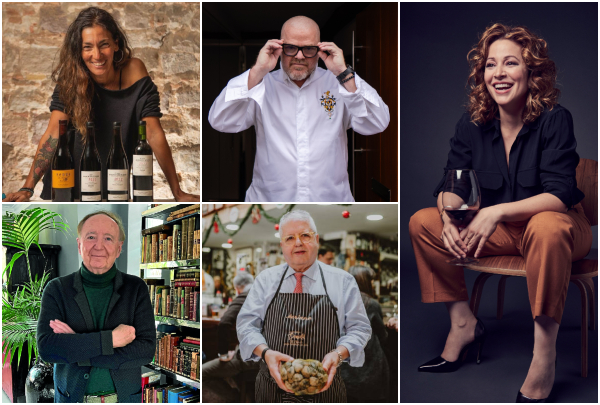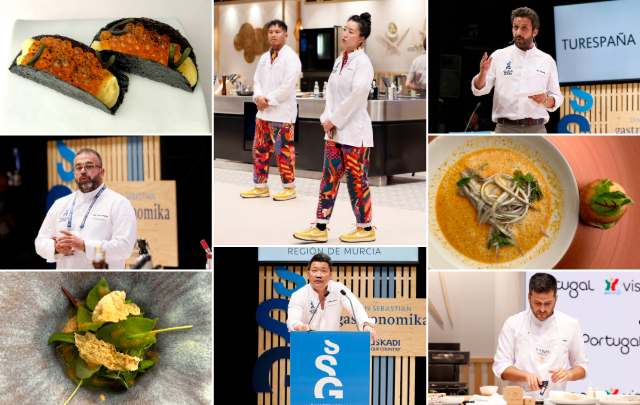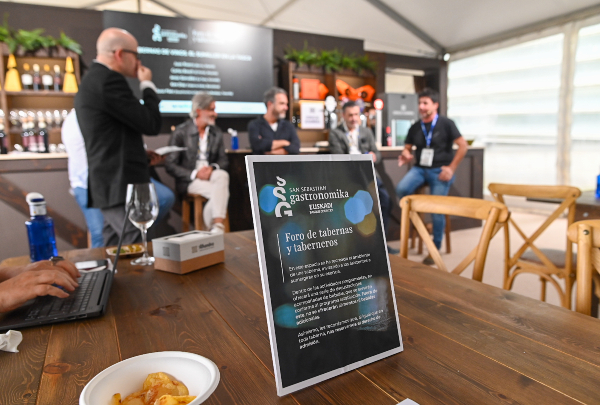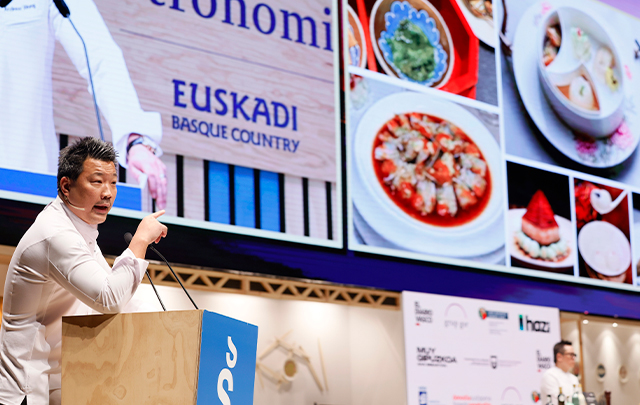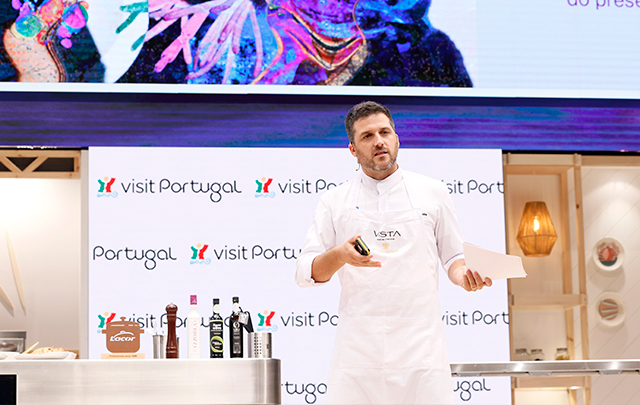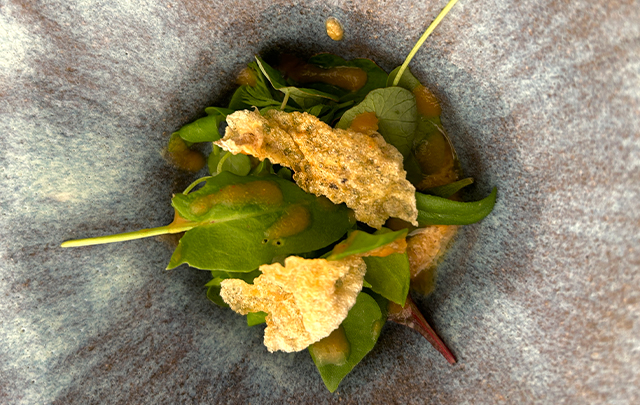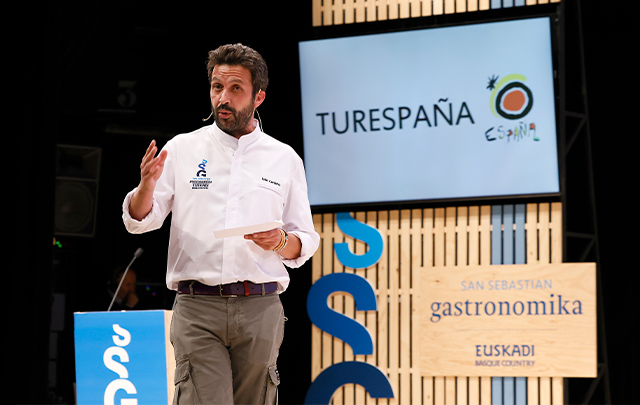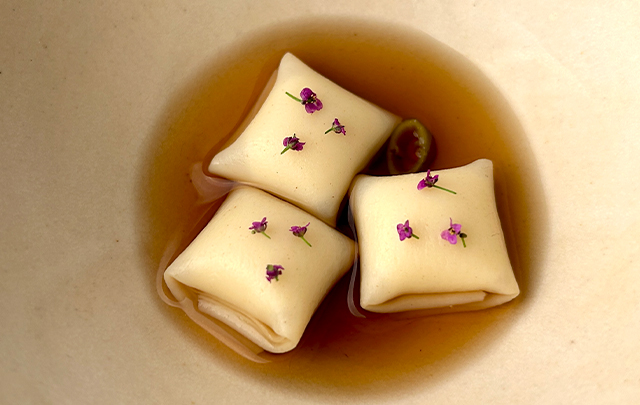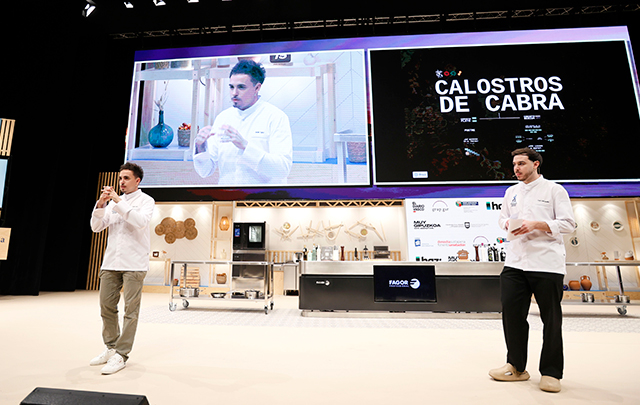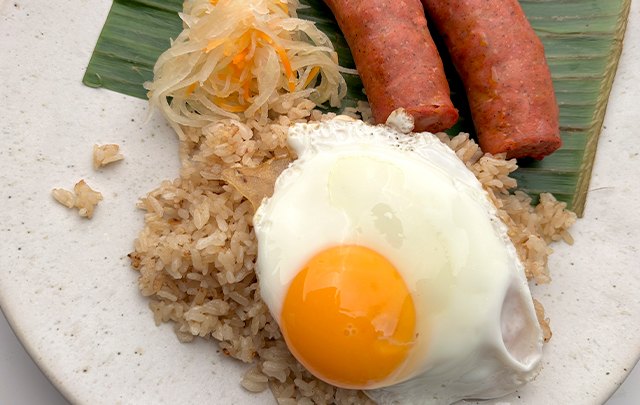News
Ricard Camarena's intuition and talent triumph over artificial intelligence at San Sebastian Gastronomika
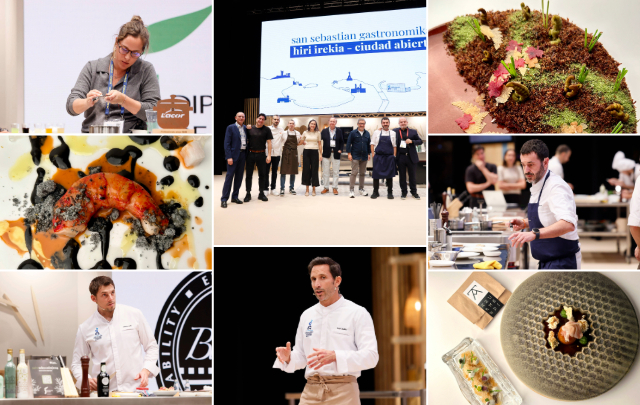
It was an unprecedented challenge and, for now, the chef's ingenuity continues to win out over Artificial Intelligence, which has shown its limitations in haute cuisine. Ricard Camarena and this technology, led by physicist Eneko Axpe, chemist Laia Badal and chef Daniel Barrionuevo from the Alícia Foundation, had challenged each other yesterday to prepare a starter, a main course and a dessert using the same guidelines, techniques and ingredients. The three proposals were judged by a jury made up of journalist José Carlos Capel, Manuel Villanueva, general director of content at Mediaset, and chef Joan Roca. Camarena won the first two dishes, and there was a draw (with a tie) for the dessert.
The first dish had to combine five ingredients decided by the congress participants, such as tuna, figs and chestnuts, while the main dish was hake, which had to be prepared using two techniques: salt curing and roasting. For dessert, a reinterpretation of carrot cake was the most popular choice. The jury felt that the first two AI proposals lacked soul, although Joan Roca admitted that this starter could "fit in" in a Michelin-starred restaurant.
Camarena admitted that he was guided more by intuition than reflection, probably because he only had 24 hours to come up with these three recipes. The AI? He left some interesting details: you can see its limitations in haute cuisine, it leaves room for interpretation by the person carrying out his orders, he opted for the Basque tradition in the preparation of the hake and he knew that this challenge would be held in the framework of San Sebastian Gastronomika. He also knew Camarena. 'The fact that I can compete with such a chef seems brutal to me. It blew me away,' said a proud Axpe, despite the 'defeat'.
Axpe himself, accompanied by Julen Baz (Garena*, Dima, Bizkaia) and safety systems specialist Jon Sola, unveiled an invention that could revolutionise cooking thanks to its speed and sustainability: a grill system in which the food closes the circle. Two data that support this tool, which has already been patented: a kilo of txuleta can be grilled in ten seconds and the CO2 emissions of a hamburger cooked on a barbecue are equivalent to more than 4,500 cooked on this griddle.
A journey with many stops
Today's day at the Auditorium has been a continuous journey through flavours and ways of understanding cuisine. It began in Donostia, where the Argentinian Paulo Airaudo (Amelia Restaurant**, San Sebastián) brought back the emblematic Ibai Restaurant with the aim of refining the most traditional Basque cuisine. The Cordoban chef has created three recipes that perfectly illustrate this ambition. For his part, Eneko Atxa (Azurmendi***, Larrabetzu, Bizkaia) wanted to confirm the idea that "flavour is an invisible ingredient, but very present. Aroma is the preamble to happiness". Atxa has spent years researching, innovating and perfecting techniques that transform aromas into something practically edible.
The Auditorium also welcomed José Avillez (Belcanto**, Lisbon), one of the greatest champions of Portuguese cuisine. He has been responsible for updating the most traditional recipes, which for years has cost him the hatred and threats of his countrymen, who thought he was destroying the most classic Portuguese cuisine. The presentation by Luis Alberto Lera (Lera*, Castroverde de Campos, Zamora) and Edorta Lamo (Arrea!*, Kanpezu, Álava) was a plea for the rural environment that they both strive to restore every day.
From France comes Fabien Ferré, the youngest chef to receive three Michelin stars, and he did it in one go. At La Table du Castellet*** (Le Castellet, France), he offers a cuisine without parasites, without those products or flavours that mask the virtues of others.
The last stop of this morning's journey has taken us to Peru, where Virgilio Martínez (Central, Lima) and Pía León (Kjolle, Lima), at an altitude of almost 4,000 metres, are reclaiming the traditional Peruvian cuisine and looking at the world from a different perspective. Two of Latin America's and the world's most important chefs have set out to explore the biodiversity of a little-known but extremely valuable land.
Portugal, Gipuzkoa and Italy.
The second day of the Auditorium surprised us in the afternoon with a variety of presentations.
Marlene Vieira (Marlene, Lisbon) and João Sá (Sála*, Lisbon) brought the new Lisbon to the Kursaal, where different cultures mix with a flourishing gastronomy. Andoni Luis Aduriz (Mugaritz**, Errenteria) always tries to stir the minds of the congress participants with a touch of provocation, which he never lacks. Mugaritz, on the other side of the mirror. Lo que no se ve" (Mugaritz, on the other side of the mirror. What you don't see) is a journey into the world that is the inverse reflection of reality.
The first stop of this edition of the congress in Italy was in Florence to listen to Karime López (Gucci Osteria da Massimo Bottura*) talk about the ideas that come into her kitchen from all over the world. The last speaker of the day, Rodrigo Castelo (Ó Balcão*, Santarém, Portugal), gave a presentation focusing on regenerative cuisine, the environment and the relationship with producers.

